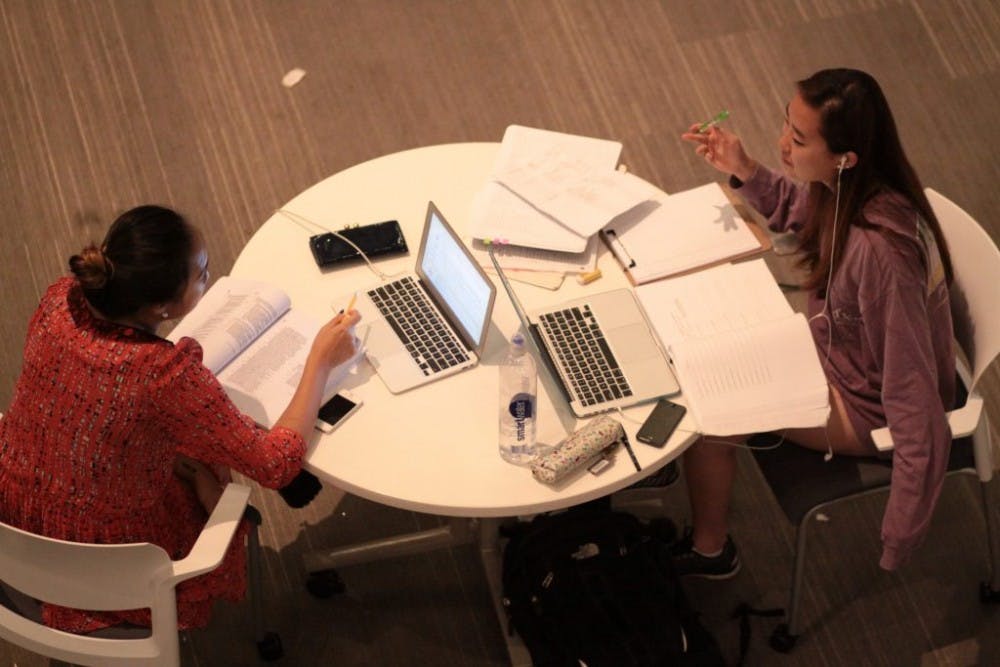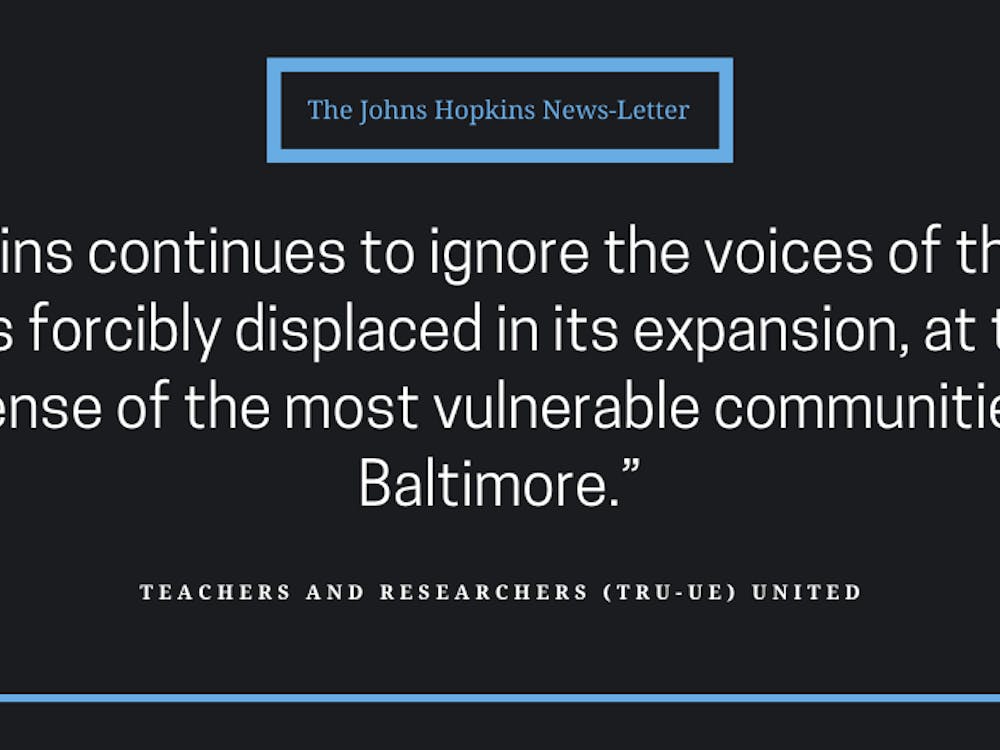The University has launched a new Second-Year Experience (SYE) Program, led by Assistant Director Aaron Rutledge, to fight against the “sophomore slump.”
Hopkins students often struggle during their second year with increasingly challenging classes and looming career expectations.
The program intends to develop new second-year initiatives to assist students in their transition from freshman to sophomore year.
Mental Health
The “sophomore slump” is a period of anxiety many students feel as classes get harder and the unclear, post-college future gets closer. As the novelty and excitement of college wears off after their first year, students have more difficulty continuing to thrive throughout their sophomore year.
Matthew Torres, the executive director of the Counseling Center, argued that while students at all levels face challenges and stresses, there are some issues particularly pertinent to sophomores.
“The newness of college has worn off and they face a potentially daunting ‘long haul.’ They may experience disenchantment with their major and face the difficult decision of how to proceed,” he wrote in an email to The News-Letter. “They may not have found satisfying connections with their peers and with the university and feel like nothing they have tried has worked.”
Junior Minji Kim took a year off after her sophomore year after struggling academically and emotionally.
“Sophomore year is when people start focusing on the future. Not only is it more academically demanding, but I also think that people start buckling down and looking at ‘what are the steps I need to take to get to where I want to be post-grad,’” she wrote in an email to The News-Letter. “I was burnt out physically from studying especially as a pre-med… To be honest, I wasn’t treasuring my mental health.”
Torres considers the lack of support for second-year students to be one of the main reasons for the “slump.”
“First-year students have traditionally received a great deal of support as they transition to their school but that structure and programming has tended to drop off considerably for sophomores, so those who are still struggling may feel a lack of support,” Torres wrote.
Rutledge hopes that the SYE Program can ta ke on such a supporting role to help students.
“There’s no shock that Hopkins students are stressed. You’re at a very rigorous institution,” Rutledge said. “What are some things that I can do within the SYE Program to help make sure that while that stress is a constant, that it is not consuming you? Because when stress starts to consume you and your mental health starts to consume you in negative ways, you can’t be a full and productive student.”
Rutledge referenced data which supports the existence of a “sophomore slump,” adding it needs to be addressed more directly.
“We know from national data that the ‘sophomore slump’ has been around for a while and so naturally there should be some additional component of a student undergraduate career that looks at that and addresses that,” Rutledge said. “It is unfair for us to continue to let them be in this slump and not have any type of outlet for that slump.”
Other than social engagement and career preparatory events that the SYE is implementing to tackle issues of social anxiety and academic confusion, Rutledge is also working with the Counseling Center to identify and address more of the immediate stressors of sophomores.
For example, the SYE Program is considering providing information about apartment hunting, lease signing, commuting from different apartments and picking roommates in order to alleviate the stress sophomores feel before moving off-campus for their junior year.
Building Community
Rutledge observed that there is a clear disparity between the amount of resources allocated to freshmen and sophomores across college campuses in the U.S.
Having worked closely with students transitioning into college at the University of Washington in St. Louis and Emory University, Rutledge has been drawing on his prior experiences in his new job.
“I think that a lot of the time, you get all of these resources your first year as you transition, and then nationally, you see the feeling of being neglected going into and throughout your second year,” Rutledge said.
At Hopkins specifically, pre-orientation programs, first year mentors, freshman seminars and B’More Intersession courses all contribute specifically to easing freshman into the college experience. Rutledge believes that students should continue to feel a strong sense of community inclusion and engagement in their second year.
“Some of the students I talked to here at Hopkins have said that they kind of put their heads down and bear with it until they get to their junior year. That’s not the kind of community I want here at Hopkins,” he said. “When I think about the second year, what helps make it successful is continuing to build off of that community. I want them to have an identity as a second year class. I want them to feel that they are part of a community that values them and wants them to be there.”
The SYE Program is working to create such an environment through social events. The program is also partnering with other Hopkins organizations to foster sophomore class interaction at annual campus events like Hoptoberfest.
“We’re looking at doing smaller programmatic pieces at Hopkins traditions like Hoptoberfest. We’re looking to partner with the HOP to have a second year specific program or being present at something that’s already happening during that series,” Rutledge said.
The planned social events have had a strong turnout, with up to 300 sophomore students in attendance. However, the events have garnered mixed reviews from the students who participated.
Sophomore Liresa Hearn felt that the Second Year Sunday Brunch was underwhelming.
“They’re finding new ways of creating events with us and keeping us engaged on campus, but I feel like it’s not the greatest idea just because of the limited options at Nolan’s,” Hearn said. “The brunch was sad because they hyped the brunch like it was supposed to be this amazing event, but it was basically just a small breakfast.”
Sophomore Jaycee Yao, on the other hand, enjoyed the event. She praised the program’s intentions, adding that they were developing multifaceted ways for sophomore students to develop community.
“I really like how the program is trying to branch out to the student body and trying to link us together with an advisor,” Yao said. “I also like the social events that SYE created, such as the SYE brunch, for it is a great opportunity to bond us sophomores, as well as others together. It’s quite innovative and yet thoughtful. I went to the brunch and I really liked it because I got to eat a lot of good food and got to meet other sophomores.”
Yao also suggested that the SYE Program plan more social engagement activities off-campus.
“To me, having more bonding activities sounds good,” she said. “We could all go to Six Flags as a class, do volunteer work or something.”
Career Exploration
While peer institutions have started implementing programs for sophomores that are similar in structure and purpose to their first-year experience agendas, the SYE Program at Hopkins is placing more emphasis on tailoring its events and functions to the specific needs of individual second-year students.
“In your second year, you are still dealing with the transition into a new space,” Rutledge said. “You’re dealing with academic clutter from everything around picking a major to potentially thinking that your major may not be the right decision. You’re starting to worry or at least have in the back of your mind, post-graduation. I think for your second year, really being able to start catering those experiences to the needs of those students is important.”
Rutledge further elaborated that having a robust career services system in place would greatly benefit sophomore students.
“One student may not need help from the Career Center to write their résumé because they already have that worked out, but may need to get connected with academic support services because they’re interested in time management. It’s about making sure students are getting what they need at that point in time,” he said.
Additionally, the SYE Program is looking to partner with the JHU Hop-In Program, which helps students from marginalized communities transition into college, in order to provide a networking seminar and event to students who need the skills and experience.
“Free” BBQ Backlash
The new SYE Program began the year with a BBQ at Nolan’s. The event attracted over 600 sophomores. While it garnered wide participation, students pointed out several problems that gave them a negative impression of SYE. The BBQ, which was advertised as “free entry with meal plan,” had students with meal plans pay for food.
Sophomore Vyshnavi Anandan criticized SYE for the mishap.
“I’m on the 1400 [dining dollar] meal plan, so I only went because we all thought it was free. I think that the biggest issue was the false advertising. They should either clarify the advertisements or actually make events free,” she said.
Aaron Rutledge acknowledged this mishap as a mistake on his part.
“I realized that caused some confusion around some of the marketing and actual implementation of the event, so we’ve tried to address that with the brunches and things like that moving forward. That is something that I will take ownership of, I have apologized for and will continue to apologize for. It was not a great way to start the year and so, as we continue to develop this program, that feedback is valuable to me as I continue to figure out what works and doesn’t work with this program.”
SYE has addressed this issue by providing free Insomnia Cookies during Rutledge’s office hours and changing event advertisements to clarify that entry into Nolan’s will always require a meal swipe, dining dollars or a meal pass.
Students also noticed that their peers who were not on meal plans were allowed into the BBQ for free.
Sophomore Morgan Balster expressed her discontent with the unequal treatment.
“I paid for my meal plan, so a meal swipe is worth money to me, so I think it’s ridiculous that I had to pay for the SYE barbecue while people without meal plans got in for free,” she said.
Rutledge explained that he is working hard to ensure that future events at Nolan’s make use of fair practices, but also that they are accessible to as many students as possible.
“I want to make sure that any student that wants to come to an event at Nolan’s can come,” Rutledge said. “For students that don’t have meal plans, we’re working with Residential Life, JHUnions and Dining to figure out a way to either supplement or help pay, or maybe potentially have those students just buy a meal pass for specific events to make it more equitable.”
While the SYE Program is trying to provide sophomores with the instruments they need for a more successful and less stressful second year, sophomore Timothy Lee believes that everything still depends on the students themselves to make the most out of these resources.
“I think it’s a nice gesture,” Lee said. “However, I feel people who want to get something out of their sophomore year and be involved will and those who don’t won’t.”
Rutledge emphasized that SYE is open to students’ suggestions and criticism alike. He encouraged students to speak to him during his office hours to ensure that the SYE Program could engage as many students as possible in helpful ways in the future.
“My hope is that we can find a way for you to engage... on this campus,” he said. “So SYE is looking at that: what are we missing when it comes to social engagement on this campus and community building on this campus, and what is the fix and immediate solution that we can create.”























Please note All comments are eligible for publication in The News-Letter.